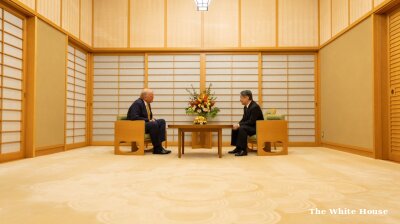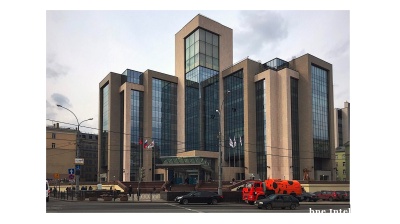Belarusian authorities have launched a criminal investigation against 78-year-old activist Nina Bahinskaya for wearing a white-red-white pin in Minsk in 2024, according to a report by Human Rights Group Viasna published on May 8.
Officials deemed the act a case of “solitary picketing,” citing the colours of the historic Belarusian flag, which was replaced in 1995 under the regime of President Alexander Lukashenko with the current Soviet-style red and green design.
The white-red-white flag, the same flag the opposition uses, once the official symbol of an independent Belarus, has since been labelled a “non-registered symbol,” and its public display is prosecuted as “unauthorised picketing.”
Bahinskaya, a retired geologist, has become widely known for her solo demonstrations opposing both Soviet and Lukashenko-era authoritarianism. She has regularly walked the streets of Minsk carrying the white-red-white flag. “The authorities are trying to silence any peaceful expression of dissent,” Viasna said in its statement.
The earliest recorded instance of Bahinskaya publicly walking the streets with the historic white-red-white Belarusian flag dates back to 1988. This was during the late Soviet period, as national movements were beginning to gain momentum across the USSR. She took part in early demonstrations for Belarusian independence and remembrance of Soviet-era atrocities.
In 2024, human rights monitors recorded three separate charges filed against Bahinskaya for wearing the pin. Under a 2021 amendment to the Belarusian Criminal Code, repeated violations of this kind can result in a prison sentence of up to three years. Viasna noted that only six such cases have been brought to court since the law’s adoption.
Bahinskaya’s defiance quickly made her a prominent figure within the opposition. In 2020, when confronted by police and accused of violating a government ban on unauthorised demonstrations, she replied curtly, “I’m taking a walk” – a phrase that was soon echoed by thousands and adopted as a rallying cry at protests across the country.
One particularly vexing form of protest for the OMON were the all women protests that were happening weekly after the disputed elections of 2020. The OMON struggled to find a way of dealing with the hordes of interlinked women. Not only in the female exclusive protests; women would gather around and shield men the OMON were trying to detain.
Bahinskaya commented: "I noticed that the riot police more rarely beat protesters when they see elderly people among them," she told The Associated Press at the time. "So I come out to protest as a defender, an observer and a witness. I'm psychologically and intellectually stronger than the police. Even among those who detained me, there were people who respected me."
An instance of this was after she was detained for carrying the white-red-white flag and was released. As she left the police station, an officer reportedly returned the confiscated flag to her and said: “I know this is important to you.” The story was widely shared by local activists and media as a rare instance of personal respect shown to Bahinskaya by law enforcement, despite the political climate.
Despite incurring thousands of dollars in protest-related fines over the years, Bahinskaya has consistently refused to pay. In response, the state has seized her personal property, subjected her to forced psychiatric evaluations, imposed travel restrictions and blocked access to communication services.
Her most recent detention comes amid a rise in arrests linked to protest-related legislation. Human rights groups report an increase in prosecutions under charges of “participating in actions that grossly violate public order,” (Art. 342) a trend they attribute to the imminent expiry of the five-year statute of limitations related to the 2020 protests.
Former detainees from Akrestsin report a surge in arrests under Article 361-4 of the Criminal Code for alleged facilitation of extremist activity linked to the "Hayun case," with most of those detained being men and transferred to pre-trial detention centres. Detainees continue to be held in inhumane, overcrowded conditions at Akrestsin detention centre.
Following the disputed presidential election in 2020, more than 3,000 people were sentenced for participating in mass demonstrations, widely condemned by international observers as unfree and unfair. While the official number of political prisoners stands at approximately 1,200, Viasna reports that courts continue to issue an average of 143 politically motivated sentences per month.
“Bahinskaya is a symbol of resistance to totalitarianism within the country, and it is important for the authorities to break her,” Viasna representative Pavel Sapelka told the Associated Press. “This is a showcase against an elderly person who has dedicated her entire life to the fight for freedom.”
Belarusian opposition leader Svetlana Tikhanovskaya, now in exile in Lithuania, also condemned the case.
“Today, the regime is still afraid of Nina Bahinskaya’s courage. For decades, Nina has stood up to tyranny.”
News

US-China trade talks deliver breakthrough as markets rally ahead of Trump-Xi meeting at APEC
How and if China will react to a US-Japan rare earths deal remains to be seen but Beijing has said it will suspend its restrictions on rare earth metal exports in what is a move likely to ease pressure on the US tech and defence sectors.

US, Japan sign rare earths deal to ‘secure’ supply chains
The two leaders signed an agreement establishing a framework for cooperation in the mining and processing of rare earths and other essential minerals; a move that underscores growing anxieties over China’s dominance in the sector.
.jpeg)
Mexico secures trade extension with US, averting November 1 tariff escalation
US President Donald Trump and Mexican President Claudia Sheinbaum have agreed to extend a critical trade deadline by several weeks, granting negotiators additional time to resolve 54 outstanding commercial barriers between the nations.

West Africa’s BRVM market cap hits record $21.2bn driven by telecoms, banks
West Africa’s regional bourse hit a record market capitalisation, up 29% YTD, supported by strong performance among telecom and banking stocks, and rising participation from domestic institutional investors.




